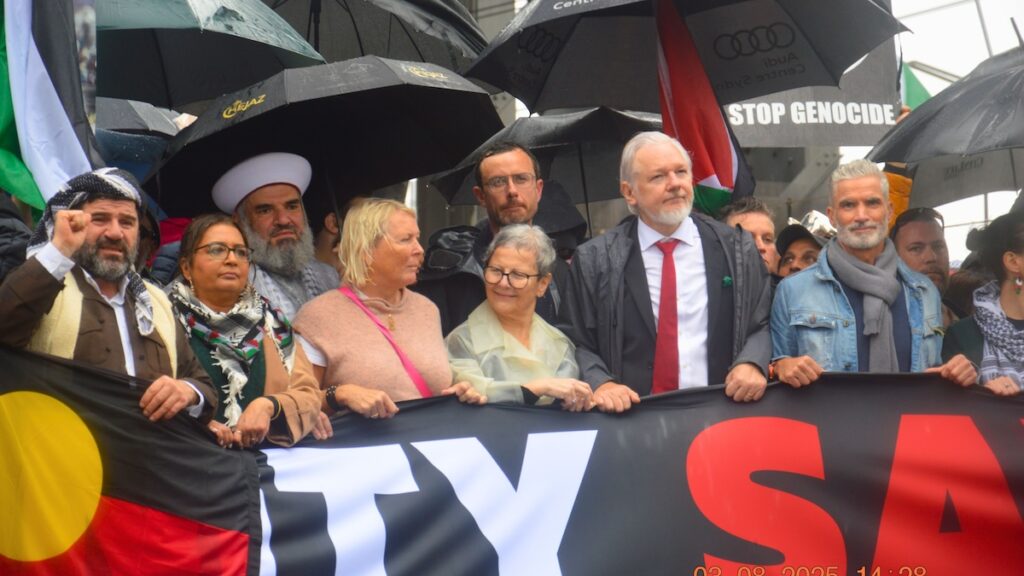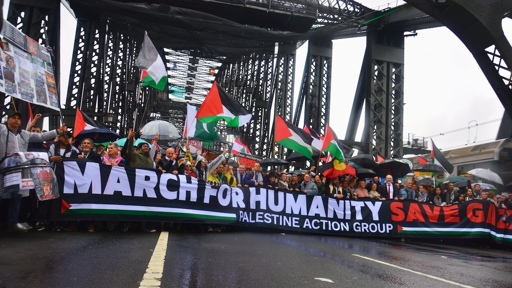On Sunday afternoon, August 3, 2025, heavy rains were not the only thing pouring into the streets of Sydney. The city witnessed one of the largest anti-war protests in its history when an estimated 300,000 people marched across Sydney’s iconic Harbour Bridge, calling for a ceasefire, an end to the starvation of civilians, and for Australia to sanction Israel.
While the heart of Sydney was flooded with pro-Palestine protesters, six more people died from starvation in Gaza, raising the toll to 175, including 93 children. Israeli attacks also killed at least 69 people on the same day, including 37 reportedly seeking aid. As Israel escalates its genocidal campaign against Palestinians, using starvation as a weapon of war, the urgency of global mass protests becomes critical.
Grey clouds swallowed the Harbour Bridge, as people expressed outrage, grief, and demanded justice. Mothers pushed strollers, elders in keffiyehs leaned on walking sticks, and teenagers shouted over the wind.
Among the tens of thousands of protesters were high-profile participants, including WikiLeaks founder and former political prisoner Julian Assange, former Australian Foreign Minister Bob Carr, and Sydney City Lord Mayor Clover Moore. At least five Labor MPs defied Premier Chris Minns and attended the march or publicly endorsed it. Their presence reflected growing dissent within the ruling party over its muted response to Israel’s actions. These MPs argued that silence or political hesitation in the face of mass civilian starvation and war crimes is unacceptable.
 Mehreen Faruqi, Senator of Australia, WikiLeaks founder Julian Assange and former soccer star turned activist Craig Foster joined the rally. Photo: Apurva Chaudhry
Mehreen Faruqi, Senator of Australia, WikiLeaks founder Julian Assange and former soccer star turned activist Craig Foster joined the rally. Photo: Apurva Chaudhry
Australians demand sanctions on Israel
The demonstration raised clear demands to the Australian government: an end to military cooperation with Israel and sanctions against the apartheid state. Josh Lees said in his comment to the media, “Premier Chris Minns said that today would be chaos, instead we saw a beautiful, inspiring outpouring of humanity, of the best of people, people who want to stand up for people on the other side of the planet. Surely, the Prime Minister can no longer ignore us; we need to sanction Israel now.”
Foreign Minister Penny Wong has admitted, in parliament, that Australia contributes to the “global F-35 [joint strike fighter] supply chain”. But she then goes on to argue that it’s only “parts” and that they are “non-lethal in nature”. As if a child’s skull can tell the difference. We’re living in a dystopia where babies are being starved and children shot in the chest, while world leaders split hairs over whether their exported screws and sensors are technically the ones that kill. Bureaucratic evil wears a polished grin.
Attempts to stop protest failed
The march was also a political victory for the pro-Palestine movement. Ruling against the police, the New South Wales (NSW) Supreme Court cleared the way for the Harbour Bridge protest, affirming an urgent public response to the Gaza crisis.
The police had sought a court order to ban the protest, but the Court denied the request just a day before the march. Justice Belinda Rigg acknowledged the safety risks but agreed with Palestine Action Group (PAG) organizer Josh Lees, who argued that the scale of Gaza’s humanitarian crisis demanded an urgent public response. She found no proof that banning the protest would improve safety and ordered the bridge and nearby roads to be closed to traffic.
Critics of the rally were swift. Some media called it a “logistical disaster”. The state government bristled at the AD 1.4 million in policing costs. The Premier had previously dismissed the march as “unnecessary disruption”. And yet, the image of the entire Harbour Bridge blanketed by protestors in the pouring rain will remain long after the cost is tallied and the headlines fade.
Organizers asserted that any logistical issues were the result of police mismanagement – despite having eight days’ notice, authorities chose to spend resources dragging the protest through the courts rather than preparing for it, prioritizing suppression over the democratic right to protest.
An elderly protester, Agnes, said that despite heavy rains, it was crucial to come out on the streets as it is nothing compared to the suffering of the people in Gaza, which needs to stop. She added that the historic march on the Darling Harbour Bridge sends a powerful symbolic message to the world that “we have not forgotten about Palestinians”.
The bridge was closed to vehicles from 11:30 am, as crowds began assembling at Lang Park in the Central Business District. Despite heavy rain, thousands marched across the 2km span, filling its full length by early afternoon.
The protest officially started around 1 pm, with organizers and supporters braving the stormy conditions. “This turnout has exceeded even my boldest expectations,” said Lees, speaking from the front of the march. “This is a united call to end genocide, our leaders must hear it and act by sanctioning Israel.” The entirety of the march lasted for over three hours, and the numbers were staggering. Only aerial views can attempt to show the enormous outpouring of the protestors.
Rain and wind fails to deter outpouring against Israel’s genocide
The winter wind and pouring rain did little to deter the tens of thousands who rallied in the city’s heart. They transformed the 2.5-kilometer route to the bridge into a vibrant sea of Palestinian flags – a stark reminder that the citizens of Australia will not stand by a genocide even if their political leaders do.
Sydney’s Harbour Bridge has hosted many moments – celebrations, marathons, parades. But on this day, it held something different: outrage sharpened into purpose.
The images of soaked protestors shoulder to shoulder, walking across the arches in defiance of silence, became emblematic of a public waking up – not to a distant war, but to its own role in confronting it.
It wasn’t just about Palestine.
It was about showing that ordinary people have immense power when they come together and unite against imperialism, wars, and genocide.
The march may be over, but its message echoes far beyond the Harbour Bridge. As starvation tightens its grip on Gaza and civilian deaths continue to mount, organizers say the time for political caution has passed. With tens of thousands demanding action in the streets, the question is no longer whether Australians care, but whether their leaders are listening.
The Palestine Action Group ended the historic demonstration with a call for a nationwide march for Palestine on 24th August.
Apurva Chaudhry is a Sydney-based journalist.
The post “A united call to end genocide”: 300,000 march for Gaza in Sydney, Australia appeared first on Peoples Dispatch.
From Peoples Dispatch via this RSS feed


